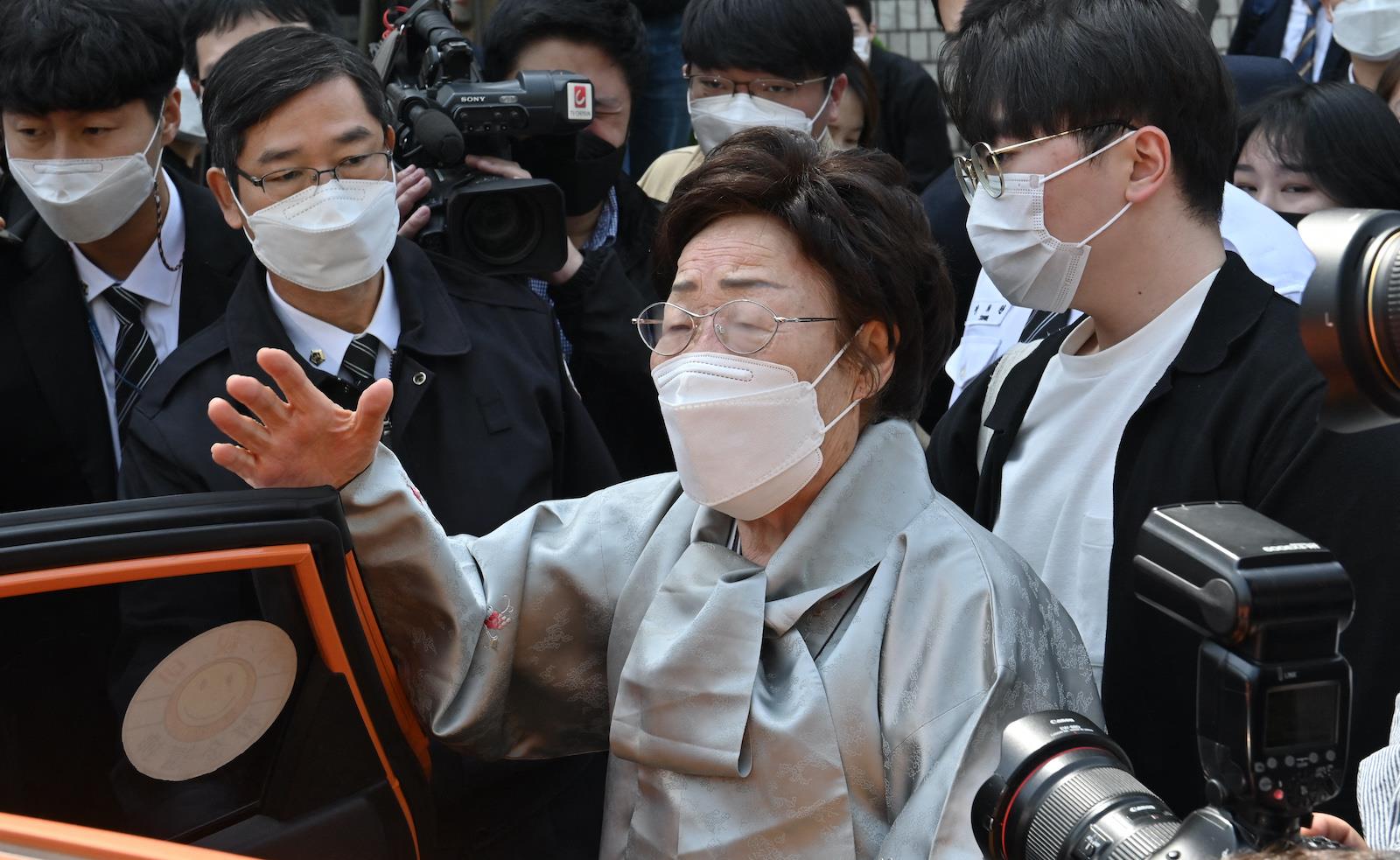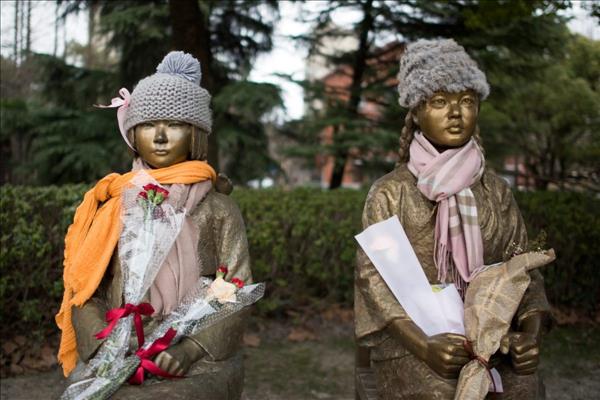
Sparks Keep Flying Off Comfort Women Brouhaha
SEOUL – One might reasonably sympathize with the gently-mannered, grey-bearded academic who wakes up in the morning to hate mail and who has been subject to a global campaign to silence his voice and withdraw his research merely for taking a contrarian view of a historical topic.
But upon learning that the professor in question is Harvard University's J Mark Ramseyer, and that the topic in question is one of the Pacific War's most explosively emotive legacy issues, one's sympathies might transition to puce-faced outrage.
In 2021, Ramseyer generated perhaps the biggest storm to shake East Asian studies within living memory. An academic paper he authored that year challenged the conventional narrative surrounding“comfort women” – the women, widely considered sex slaves, who staffed Japan's military brothels during the Pacific War.
The repercussions were – at least by the standards of academe – seismic.
South Korean media was outraged. In the US, academic and popular rebuttals were published, petitions were circulated and signed, demonstrations were held and demands were made for the withdrawal of his paper. Even North Korea waded in, calling him a“pseudo-scholar.”
But amid a raging worldwide debate over so-called“cancel culture” and the limits upon freedom of expression – recently visible in the angst surrounding billionaire“free-speech absolutist” Elon Musk's moves to acquire online platform Twitter – Ramseyer also found some defenders.
The defense rests upon the foundation of academic freedom. But the comfort women issue extends beyond the gates of the academy to the corridors of power, for it has poisoned bilateral relations between Seoul and Tokyo since it first arose in the early 1990s.
The two sides' positions can – very, very broadly – be summarized as follows.
South Korea's stance is that Japan has neither appropriately apologized nor adequately compensated the victims of its 1910-1945 colonial rule. Moreover, its political and educational sectors refuse to take responsibility for past crimes and a reactionary clique continues to hold influence over Japan's polity.
Japan's position is that it has repeatedly apologized and compensated but has been rejected again and again and thus accuses Seoul of bad faith. Moreover, Korean activists exaggerate or even in some cases invent historical details and actively humiliate Japan on the issue in the global community.
How a more nuanced, less polarized understanding can be reached vexes Joseph Yi, a Korean-American academic.“How can we foster open discourse?” Yi wondered.“We need more open debate for better relations between Korea and Japan.”
Yi is the co-founder of the Heretodox Academy East Asia Community, affiliated with the global Heretodox Academy, which lobbies for freedom of expression and diversity of viewpoint in academia.
Korean and Korean-American students need“to have a more complex understanding of our pasts,” Yi said. Teachers should“challenge our students to grow intellectually,” he added.
That may be a laudable ambition. But given the experience of Ramseyer and others who have taken his line, it is also a risky one.

Mark Ramsayer is under academic fire on several fronts. Image: Twitter
The American, a former Japan resident, occupies Harvard University's chair of Japanese Law, endowed by the Japanese corporation Mitsubishi. In 2018, he won Tokyo's“Rising Sun” decoration for his contributions to Japanese studies in the US.
In 2021, he penned a paper for the International Journal of Law and Economics. The 8-page work, “Contracting for sex in the Pacific War” , sought to prove that Korean comfort women were contracted prostitutes who chose to work in the military brothels operated across East Asia for the use of Japanese troops.
Many comfort women were able to demand substantial up-front compensation, he wrote –and the majority of the girls were Japanese, not Korean. Ramseyer's findings won kudos from revisionist and hard-right groups in Japan, including the conservative Sankei newspaper.
However, they flew in the face of a widely held narrative: That the Korean comfort women were sex slaves who were tricked or forced to serve in the brothels.
Many also believe that some 200,000 Korean females including children were kidnapped by Japanese troops for the brothel service and were massacred at the war's end to hide a dirty secret.
As word of Ramseyer's claims tore across social and then mainstream media, academics and activists across Korea the United States and further afield were inflamed.
Critics assailed him for failing to find a single contract. His paper was subjected to careful scrutiny, which found errors in citations and some of his sources were accused of partisan bias.
He and his work were blasted in publications ranging from the Harvard Student newspaper to the Guardian to the New Yorker . Multiple rebuttals appeared in academic journals , some which called for the withdrawal of his paper. He was even compared to Holocaust deniers .
In the event, Ramseyer weathered the storm and retained his position. In January 2022, Harvard Law School's John M Olin Center published Ramseyer's “Contracting for sex in the Pacific War: A response to my critics.”
That 66-page rebuttal of his rebutters included an admission of some errors but added pages of secondary sources on contracts. It also expanded the discussion to question the credibility of the“200,000 sex slaves kidnapped by Japanese troops” narrative.
That, he insists, is a belief absent from academia and held only by a“tiny, dwindling band of activists.”
Perhaps surprisingly – at least, so far – the paper has not generated the tsunami that greeted his earlier work. Still, the waves stirred by the original brouhaha continue to ripple.

Wartime abuses are still a big issue in South Korea. Protesters hold signs during an anti-Japanese rally in Seoul in April backing 'comfort women', who served as sex slaves for Japanese soldiers in World War II. Photo: Jung Yeon-je / AFP
Yi, an academic at Seoul's Hanyang University who has himself faced pushback for his support for Ramseyer's freedom of speech, put forth three contesting models of discourse.
One, he said was“Procedural liberalism: Open rational public deliberations” – essentially, a gloves-off approach to debate.
Within the comfort women area, this approach, he said, could call into question whether“some testimonies were politicized,” and whether“corrupt brokers” or“false memory” are in play.
The second model is“Victim-centered liberalism” under which the victim's role is prioritized, on the basis that oppressors' right to free speech may undermine the equality, justice and liberty of the oppressed.
As per this model, open debate“can cause psychological and emotional harm to victims,” Yi said.“It is a very strong argument…you want to mobilize and cancel offending articles.”
The third is“Scared liberals, self-censorship and conformity” in which even those with specialist knowledge decline to raise their heads above the parapets in sensitive debates, usually for reasons of self-defense.
A South Korean student on a recent webinar said that he had declined to discuss the comfort women issue for fear of being ostracized.
Today's Korea is one of Asia's leading bastions of democracy, rights and freedoms. But even within this free and open society, the topic is highly sensitive, if not quite taboo. Academics who wander from the conventional wisdom face risks, particularly at the hands of lobby groups who have wielded lawsuits to silence dissenting voices.
One, Park Yu-ha, had her book on comfort women redacted by judicial order and found herself facing lawsuits filed by activist groups. Subsequently, academics in multiple countries sprang to her defense.
Lew Seok-choon, a professor of sociology at Seoul's elite Yonsei University, has himself faced a defamation suit and prosecution investigation into his contention that comfort women were prostitutes rather than forced slaves.
“I have studied all the materials…there is no evidence that the military dragged people away, it is only survivors' testimony,” he said.“And their testimonies have changed a lot.”
He blamed lobby groups for influencing elderly survivors to change their stories, to say they had been kidnapped by soldiers.
For multiple reasons, reckons Chizuko Allen, a Japanese academic at the University of Hawaii, beliefs must be challenged.
“I feel this paradigm of victimizers and victims has taken deep root in the intellectual world,” she said.“The dominant comfort women narrative in South Korea and in the international community is based not so much on facts but on a lot of distortions and interpretations.”
She cited the case of an American colleague who had written up the dominant narrative in a US textbook designed for high school and college students. When she and a Japanese diplomat asked what his sources were, he declined to answer, she recalled.
Subsequently, she was stunned to hear that the Japanese government was being accused of applying pressure upon the textbook publisher, she said. Baser instincts have come into play, alleged the man at the epicenter of the affair.
“I am sure honesty and dishonesty is bipartisan,” Ramseyer said.“But one of the most deeply troubling aspects of this is that people I knew personally were lying through their teeth. It was a cavalier attitude toward truth that I found bizarre.”

Former South Korean 'comfort woman' Lee Yong-soo (C) speaks to the media after a court ruling of the 'comfort women' case against the Japanese government over wartime sex slavery, at the Seoul Central District Court in Seoul on April 21, 2021. Photo: AFP / Jung Yeon-je
Both within and without the walls of the Ivory Tower stand problematic issues embedded within contemporary culture. One is the incendiary ballast that currently attaches to red-button issues within sociology.
“If you get into a social issue – if you wade into anything to do with sex, gender, race, nationalism or nation-building – you are going to get a reaction,” warned Luke Nottage of the University of Sydney Law School.
A second is“presentism”, said Allen.
“There is always a danger of interpreting past events through the lens of present values and it is justified by many people – like accusing Thomas Jefferson of having slaves and destroying his statue,” she said.“But the past had different values and different circumstances.”
Pacific War-era circumstances included the plight of young girls in desperately poor rural villages in a male-centric culture.
But regardless of the wider environment, or the internal compulsion or external coercion comfort women were subjected to, it is human to feel sympathy for girls engaged in such a shabby, unpleasant and risky enterprise.
“Of course, I sympathize with any comfort woman,” Allen said.“Their working conditions were bad, it was wartime, they had to worry about their safety in addition to the kind of work they did – I don't think they really volunteered, they were compelled out of necessity or were deceived outright and in some cases kidnapped too, it is possible.”
Lew suggests that the natural sympathy offered to the victims of yesterday should extend to today.
“I am sympathetic to those comfort women who suffered,” he said.“At that same time, everybody should be sympathetic to the prostitution going on these days in Bangkok or Manila – you will find the same situation as in Korea 100 years ago.”
“All those phenomena are driven by poverty,” he said.“Why be hateful toward Japan only?”

Legal Disclaimer:
MENAFN provides the
information “as is” without warranty of any kind. We do not accept
any responsibility or liability for the accuracy, content, images,
videos, licenses, completeness, legality, or reliability of the information
contained in this article. If you have any complaints or copyright
issues related to this article, kindly contact the provider above.


















Comments
No comment